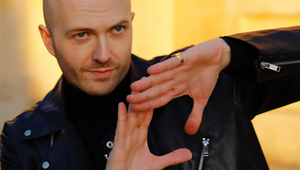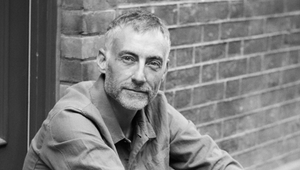
LBB Film Club: Peripheral Vision

Covid-19 has given many of us the opportunity for some pretty deep soul-searching, both on a personal and a global level. And that’s exactly the level that Great Guns director Frankie Caradonna’s short film ‘Peripheral Vision’ is working on. Philosophical ponderings on humanity explore how isolation could be the change in perspective which alters humanity’s direction for good. It’s deep stuff.
It’s also a beautiful film, brilliantly demonstrating what is possible for a creative person with relatively few resources (and a little moral support from a lover and a cat). Considering Frankie and his companions are locked down in a small apartment in Milan, the film doesn’t feel nearly as claustrophobic as you might expect.
LBB’s Alex Reeves spoke to Frankie about his poetic lockdown film.
LBB> Where did Peripheral Vision start for you? Did you just wake up one day and decided you needed to make a short film?
Frankie> Honestly to make a short film is absolutely not one of the thousands of wild thoughts that have been over populating my mind for the last several weeks. As a member of the Italian Guild of Directors I responded to a call to participate in a collective feature film about these days of quarantine, providing 15 minutes of footage that would have been edited together by a supervising team of storytellers. I liked the fact that despite many other calls and collaborative projects around, this one had an authorial perspective.
I started working on some ideas and I soon realised that I wanted to keep a certain amount of paternity on the narrative of such a story, because what's happening has too many personal and emotional implications.
I am in Milan at the moment, the city went into lockdown while I was here to direct a campaign of branded short documentaries; the area has been hit very hard by the virus and I’ve been self isolating for almost 50 days now.
The conceptual starting point of the short film is the assumption that only fools weren’t expecting the pandemic as we have been warned for years. I started hearing people being bored because of the lock down, I saw people singing on their terraces while other people were dying next door, I could hear many others saying “it’s going to be ok, we’ll be back to normal”. So I started thinking about the normality that took humanity to this point.
There was a jigsaw in my head as last December and January I travelled between Papua and Indonesia and I free-dived on one of the healthiest coral reefs on earth; when the current came from Bali though the ocean turned into a debris river; I went to visit a coral transplant project and it was very painful to see so many bleached areas. On my way back to Europe I had to stop for a few days in Jakarta and the city was half flooded, then I stopped for a few days in Doha and it was so cold that we had to wear a woolly jumper; last but not least, Australia was burning down. Then the pandemic. Boom!
LBB> How does the idea of a cat's peripheral vision drive and inform the rest of the film?
Frankie> The metaphorical prologue wants to act as a trigger for the subconscious, a key to open a door, something that subtly invites the brain to investigate reality through a more expanded peripheral vision, which works like the unconsciousness grasping and sensing. Cats have exceptional peripheral vision because they are nocturnal hunters; we are experiencing something very similar to a dark journey at night so it is important that we exercise our peripheral vision to better see in the darkness. If through central vision we can see that the link between deforestation, CO2 emissions, melting glaciers and the emergence of new strains of deadly viruses is evident, through the peripheral vision we must see that this dark pandemic could be taken as an opportunity to rethink ourselves as a collective society. There isn’t a planet B, says the voice over, is there a human B? To give more space to the unconscious means entitling feelings and intuitions to code reality, that would translate into seeing the big opportunity in front of us.
LBB> What came first, your philosophical monologue or the images that you combined it with?
Frankie> First came a random bunch of images of my cat, some still life shots of the edges of some rooftops, birds, dried flowers; I knew there would be some sort of voice over, a philosophical statement, in fact I started looking for inspiration and going back to such books as Seneca’s Moral Letters to Lucilius, the I King and Alan Watts’ The Way of Zen among others. I put together the first edit and Lucia Emanuela Curzi, my love and artistic director, made me notice that it was too cryptic and that I was missing from the film. It had to be personal, I couldn’t use anyone else’s speech or thoughts. So I started writing and then shooting again, destroying the previous rough edit and starting from scratch. It’s been an organic process, the images and the voice-over struggled to exist until they found each other.
LBB> What was the process of shooting it like? You were obviously very limited to what you had access to. How did that impact the film?
Frankie> I looked around myself and I thought: "OK I definitely have something to say; I am staying in a very nice flat, I have a narcissist cat and Lucia, my love, and she is an awesome art director and fashion illustrator too". Then I thought: “Wait a sec, I only have an almost dead iPhone 6s, two vintage Nikkor lenses which I mount on my beloved Nikon FE and a Canon 7D Series 1 which I always hated; last but not least I have a very shaky hand...".
Peripheral Vision is actually the second short film I shot by myself and in self isolation. The first was part of an audiovisual photo-philosophical project called No Guns For Dillinger, a series of 35mm silver gelatin lith prints accompanied by an art film, and it was supposed to be exhibited last March. Anyway, I ordered a tripod online and I started shooting. I would have loved to have a 100mm macro and a 16/35mm although, as a photographer, I learned how to get the most out of just one lens.
LBB> Despite it all being shot in your apartment, there's quite a diverse set of shots and visuals. What was the key to that?
Frankie> I am lucky because my apartment in Milan is very eclectic and has a variety of features that allowed me to create different environments. The building was built in 1921, there are four types of original ceramic floors, a mosaic and a modern wooden floor; there’s a beautiful bathtub and the interior design is very artistic, the general feeling is very bohemian. In general the key is not to think of limits as limitations but of opportunities instead. The switch of perspective in the brain can be life saving (well, film saving in this case). I only took two shots outside of the apartment: I snuck out like a ninja to go filming a sad bunch of old chaps playing the national anthem everyday at 6pm from their balcony.
LBB> It's obviously an intensely personal film about isolation. Did you find the process cathartic? How did making it affect your state of mind?
Frankie> It’s been really intense and I struggled a lot to start the film, continue it and finish it. If it wasn’t for Lucia I would have probably abandoned the project. After the fear and the panic of the first week of self isolation the silence came in. I wasn’t sure why I was making the film, I did not feel the need of creating something, actually I felt like the opposite: I felt the need of clearing, reordering, breath; I started doing so much yoga and I was so calm and centred that I couldn’t stand myself anymore, I felt like a freaking Siddhartha on a sinking Titanic. The idea of making a short film was a reaction to what I saw beyond the window.
LBB> Generally speaking, do you have any social distancing tips or advice?
Frankie> Smoke your own spliff and don't pass it to anyone, in the Rastafarian way.
LBB> Anything else you'd like to add?
Frankie> Yes! I can’t wait for this shit to finish and to go out shooting with my cinematic mates! And I would have never expected Superman, my cat, to be such a professional animal actor.















